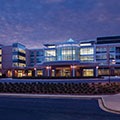
Tanner Medical Center/Carrollton Surgery Department
and Pre-Surgical Care Center (PSCC)
Phone: 770-812-9224
Located inside the hospital. Enter through Tanner’s
Clinic Avenue entrance.
The PSCC is on the ground
floor between Diagnostic Imaging and Bistro ’49.
Free valet parking is available.